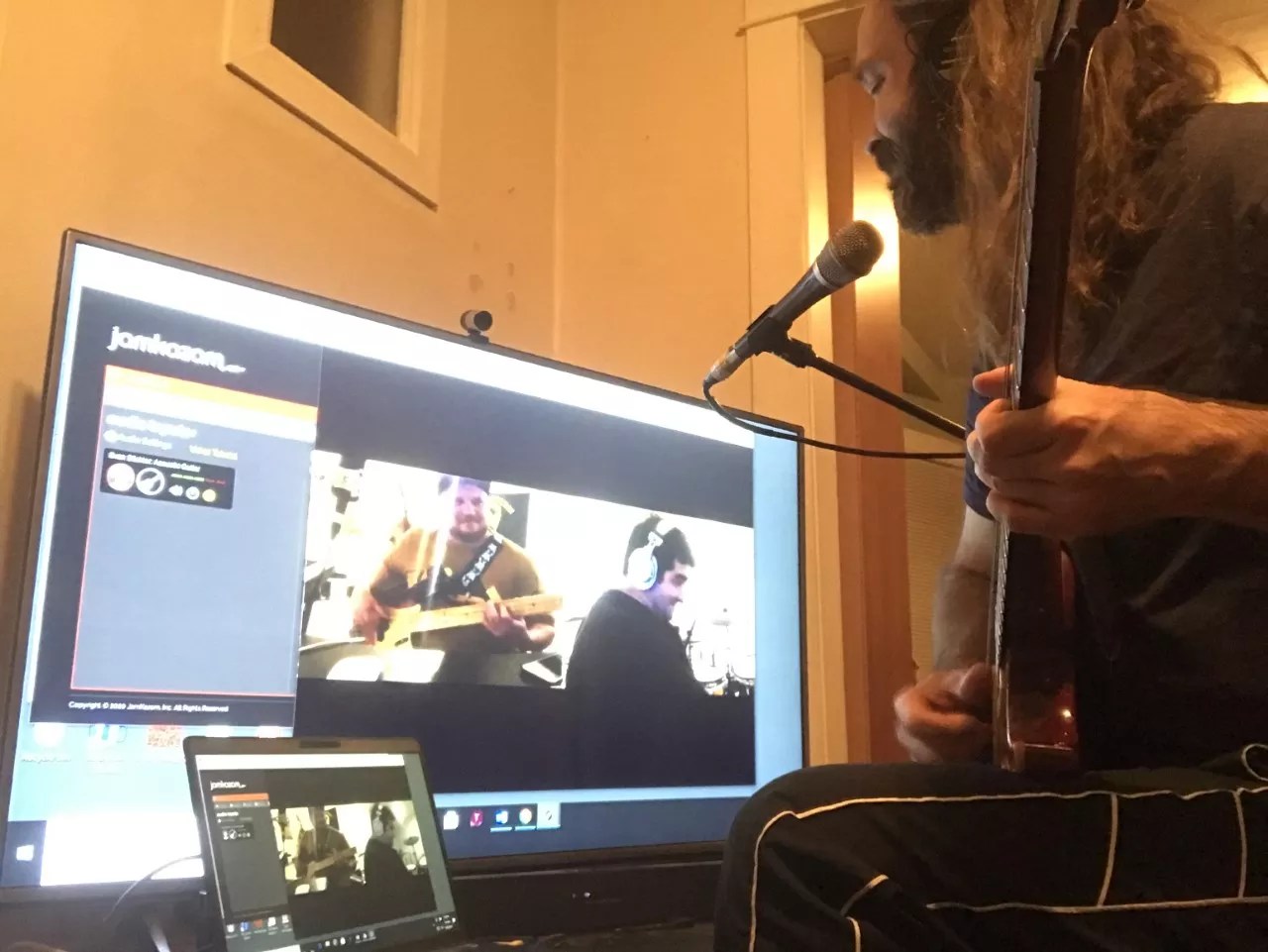
Photo by Evan Sitchler.

Audio By Carbonatix
Denver musician Evan Sitchler isn’t rushing to get back on a stage right away – but that doesn’t mean he can’t safely perform live with other people during the pandemic. Thanks to computer-based platforms such as JamKazam and Jamulus, the multi-instrumental Sitchler is still making noise in real time, despite the all-too-familiar obstacles presented by COVID-19.
“I’ve been staying at home, keeping safe and not gigging, but believe me, I want to,” says Sitchler, whose past Colorado efforts have included well-received cover projects of artists including the Beatles, Pink Floyd, David Bowie and the Doors. “Ironically, COVID has resulted in new [online] bonds and friendships for me. I’m playing with people I never would have met before thanks to these apps,” Sitchler says.
He recalls his first attempt at playing via a social networking system. “I was on a Zoom call one day a while back and someone said, ‘Hey can we play some music?’ We tried, and it was terrible. I mean, you could do music lessons, where I make a [musical] statement and you listen, and then you make a statement and I listen, but in terms of being able to play simultaneously, Zoom doesn’t cut it.”
Since his first underwhelming attempt at online collaboration, Sitchler, who runs a tech help desk at CU Denver by day, says that thanks to rapidly improving technology, he now regularly participates in very rewarding jam sessions with musicians all over the globe.
“I’m experiencing about a 90 percent success rate with my jams now,” he says.”When I first started using these in March, it was pretty bad; but once I got the right equipment, the sessions started running incredibly well. The new generations of boxes can produce what I call ‘zero latency,’ which is lightning-fast processing. You do need to use a hard wire and an ethernet connection to your router as well as a nice box to make it work right. If you have a fiber-optic connection, that’s even better. Once you have the right gear and a fast computer, you really get going. From Denver, I can play with musicians in France, Germany, Holland and all over the place. It’s amazing. We play a lot of Beatles, Stones, Zeppelin, Grateful Dead and some standards and folk songs. The technology is evolving rapidly. It’s being funded and developed right now due to high demand, and it’s quickly getting more reliable, better-sounding and more synchronized.”
Sitchler says he doesn’t always use the cameras provided by apps like JamKazam, because the visual component can bog down the speed of the sound transfer. He says the key to the experience is to invest in a relatively inexpensive yet effective interface such as those manufactured by companies including Apogee, Focusrite, Presonus or Behringer.
“You can see people if you want to use the cameras, and you can also record sessions, trade tracks and even film the jams, but you don’t really need the visual element other than to say hello or whatever. You start to develop really good listening skills. It forces you to listen, listen, listen. It’s really taking off now that people are unable to go to band rehearsals or play together. With the spike in [COVID] cases, mass isolation and a long, long winter, I think it’s a huge relief for musicians’ mental health. There’s nothing to show off in these sessions other than making the music good when the cameras are off, so it’s just people hanging out online, enjoying playing music together. There aren’t any gigs, so it’s just people connecting.” Sitchler says that when he “hits a great Beatles note” with fellow jammers, he gifts them an electronic copy of the Beatles Bible, which includes every Beatles original (and cover) ever performed by the band.
“When I suggest doing a Beatles tune, people are always down for it,” Sitchler shares. “We play stuff like ‘All You Need is Love,’ ‘Hey Jude,’ and ‘Help From my Friends.’ The joy translates across the Internet. I have my Beatles Bible on my quick share and I give them a 1,600-page PDF. It’s the most detailed account of Beatles music ever, and includes an academic score of the tunes.”
He says the difference between the two apps he uses comes down to their network-building functions.
“Jamulus is used heavily in Europe,” he explains. “It has a pretty awesome community and is sort of like Facebook, where you make a profile and put a picture of yourself up, list stuff about yourself and then you friend people. With JamKazam, you’re more on your own in terms of building your community and getting people to join you. Also, the Internet has main trunks, so if you’re on one of those, it helps. If you’re in a more remote location, that’s not as good. They are using media relay servers now, which is a new approach. It’s the first time it’s been used like this. It’s pretty awesome. Laggy jams are going away.”